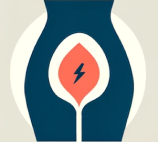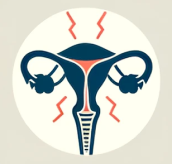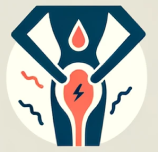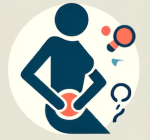
Pelvic pain
One of the most common symptoms, pelvic pain in Endometriosis can be severe and may worsen during menstruation. It's often described as cramping or throbbing pain and can significantly impact daily activities.
A brief overview of Endometriosis, its impact on women's lives, and the importance of accurate diagnosis.


Endometriosis affects 1 in 10 women globally, characterised by tissue similar to the uterus lining growing outside the uterus, leading to pain and sometimes infertility. Alarmingly, women wait an average of 7 to 10 years for a diagnosis, largely due to the commonality of symptoms with other conditions and widespread lack of awareness. This diagnostic delay not only increases suffering but also burdens healthcare systems with unnecessary visits and treatments.
The challenge of misdiagnosis is significant, often resulting in inappropriate treatments and diminished quality of life. Symptoms of endometriosis can closely resemble those of other pelvic disorders, complicating accurate identification without precise diagnostic tools.
For improved awareness and early detection, please familiarise yourself with the symptoms below, or consult your Doctor if you suspect you may be affected.

One of the most common symptoms, pelvic pain in Endometriosis can be severe and may worsen during menstruation. It's often described as cramping or throbbing pain and can significantly impact daily activities.

Women with Endometriosis often experience heavy bleeding during periods (menorrhagia) or bleeding between periods (menometrorrhagia). These irregularities can be both physically and emotionally taxing.

Dyspareunia, or pain during or after sexual intercourse, is another symptom of Endometriosis. This can affect intimate relationships and contribute to emotional distress.

Endometriosis can lead to difficulties in conceiving. In fact, it's one of the leading causes of infertility in women, creating challenges for those who wish to start a family.

Some women with Endometriosis experience pain during bowel movements or urination, especially during menstrual periods. This can be due to the endometrial-like tissue growing near the bladder or bowel.

These symptoms, especially when occurring during menstrual periods, can be associated with Endometriosis. They can affect a woman's overall sense of well-being and her ability to engage in daily activities.
Tricorian Life is dedicated to revolutionizing the landscape of endometriosis diagnostics across various regions.
We actively collaborate with inventors of innovative tests to bring rapid, biomarker-based diagnostic solutions to market, delivering results in under 48 hours. To ensure these groundbreaking tools meet the highest standards, we work with a comprehensive network of physicians, researchers, and CROs, supporting the validation process from initial trials through to approval and adoption.
Our commitment is to provide quick and dependable access to these advanced diagnostics, setting new benchmarks in the management and care of endometriosis.